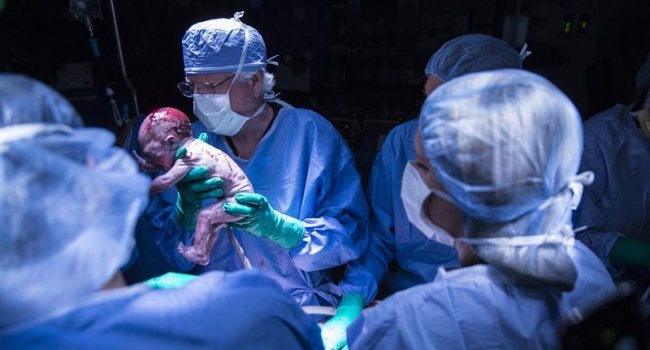The first woman in the United States gave birth to a baby after a uterus transplant. The history-making birth took place at Baylor University Medical Center in Dallas as part of an ongoing uterus transplant clinical trial, reports TIME.
According to one of the hospital’s uterus transplant surgeons, this birth has been a long time coming. “We’ve been preparing for this moment for a very long time,” says Dr. Liza Johannesson, one of the doctors involved in the trial. “I think everyone had tears in their eyes when the baby came out. I did for sure.”
Dr. Johannesson was a part of the original medical team responsible for the first ever birth after a uterus transplant in Sweden. Since then, eight women in Sweden have successfully given birth after the transplant. She believes that this birth is equally if not more important. The ability to replicate the results is paramount to the surgery becoming a viable option for those hoping to have children.
Women who are participating in the trial have lived under the assumption that they would never be able to get pregnant or give birth. They have a condition where their uterus is either nonfunctioning or nonexistent called absolute uterine factor infertility. In 2016, the Center for Disease Control and Prevention reported that 6.7 million American women are currently having trouble getting pregnant or carrying a baby to term. Most of the women involved have Mayer-Rokitansky-Küster-Hauser (MRKH) syndrome, though experts believe that the procedure could also work for women with other medical issues such as certain types of cancer. The woman who gave birth chose to remain anonymous, though TIME reports that she was born without a uterus.
After undergoing multiple surgeries and taking powerful medication for the uterus transplant, the women who participated in the trial have to recover and wait to achieve menstration. At this point, they are able to attempt in vitro fertilization (IVF). The women and doctors must often wait the duration of the pregnancy to confirm that the transplant was truly successful. These months can feel excruciatingly long compared to the mere minutes doctors often wait to know that other organ transplants, such as a liver or kidney, are viable.
Like other infertility treatments, it is uncommon that an insurance company would cover the cost of the procedure which is estimated to be up to $500,000. Baylor covered the cost of the first 10 transplants as part of the clinical trial, but they are now seeking funding through institutions and private donors in order to continue. The medical team believes that many more transplants need to be done before it could be offered as a standard treatment for infertility.
“For the girl who is getting the infertility diagnosis now, it’s not hopeless,” uterine transplant nurse, Kristin Posey Wallis, shared. She works closely with the women and their donors at Baylor. “There’s hope.”












